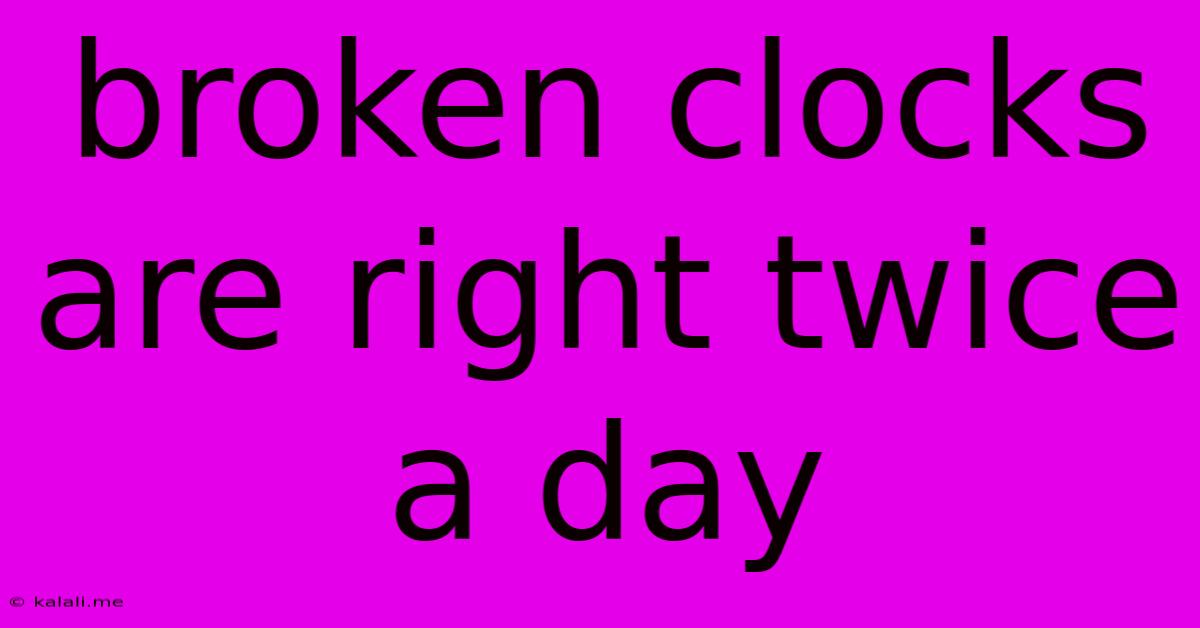Broken Clocks Are Right Twice A Day
Kalali
May 19, 2025 · 3 min read

Table of Contents
Broken Clocks Are Right Twice a Day: More Than Just a Saying
The adage "a broken clock is right twice a day" is a common expression, often used to highlight the absurdity of relying on unreliable sources. But beyond its conversational use, it holds a surprising amount of depth when we explore its mathematical and philosophical implications. This article delves into the saying, exploring its meaning and revealing why it's more than just a simple idiom.
The Mathematical Reality
Let's consider a simple analog clock. If it's completely broken, meaning its hands don't move at all, it will still show the correct time twice a day. This is because a 12-hour clock cycle has two instances where the time displayed will coincidentally match the actual time. Even a clock that's consistently fast or slow will eventually align with the correct time, albeit unpredictably. This is a basic example of probability and the likelihood of random events coinciding.
Beyond the Simple Clock: The Implications
While the literal interpretation is straightforward, the proverb's meaning extends far beyond a malfunctioning timepiece. It speaks to the fallibility of prediction and the limitations of relying solely on unreliable sources. Think about it:
-
Inaccurate Predictions: Many predictions, from market forecasts to weather reports, are inherently imperfect. Just because a prediction proves correct on occasion doesn't mean the source is reliable. Consider that a broken weather forecasting model might accidentally predict a sunny day correctly, yet remain utterly useless overall.
-
Mistaken Beliefs: Similarly, people may hold beliefs that are partially or completely inaccurate. These beliefs may accidentally align with reality sometimes, but this doesn't validate their inherent truthfulness. An individual who makes frequent inaccurate claims might occasionally be right, but that doesn't make them a trustworthy source.
-
Chance Encounters: We can also apply the principle to chance encounters. Just because you happen to encounter someone who gives you good advice doesn’t mean their advice is always sound.
-
Statistical Fluctuations: The accuracy of statistical models can also fluctuate, sometimes giving correct results purely by chance. It’s crucial to analyse the overall effectiveness and methodology behind the model, and not only base your conclusions on coincidental correctness.
The Importance of Critical Thinking
The expression subtly underscores the importance of critical thinking. It urges us to question the sources of our information and avoid blindly accepting information simply because it aligns with our expectations or has proven correct occasionally.
From Idiom to Insight:
"A broken clock is right twice a day" serves as a powerful reminder that sporadic accuracy doesn't equate to reliability. It’s a call to engage in rigorous evaluation, skepticism, and to seek out credible sources before forming opinions and making decisions. Understanding the underlying mathematics only strengthens this crucial lesson. Next time you hear the phrase, remember that it's a reminder to look beyond surface-level coincidences and prioritize verifiable truth over chance occurrences. This proverb, simple on the surface, offers a surprisingly profound insight into the nature of accuracy, truth, and critical thinking.
Latest Posts
Latest Posts
-
If You Want To Go Quickly Go Alone
May 19, 2025
-
We Look Forward To Seeing You
May 19, 2025
-
What To Say When Someone Going On Maternity Leave
May 19, 2025
-
Make A Decision Or Take A Decision
May 19, 2025
-
Can You Take A Candle On An Airplane
May 19, 2025
Related Post
Thank you for visiting our website which covers about Broken Clocks Are Right Twice A Day . We hope the information provided has been useful to you. Feel free to contact us if you have any questions or need further assistance. See you next time and don't miss to bookmark.